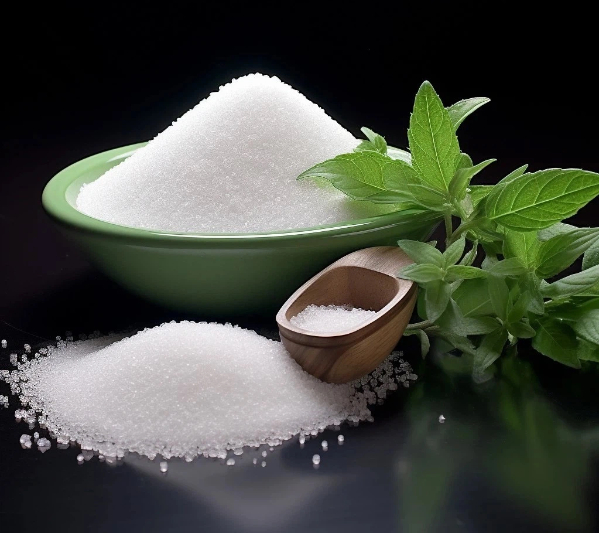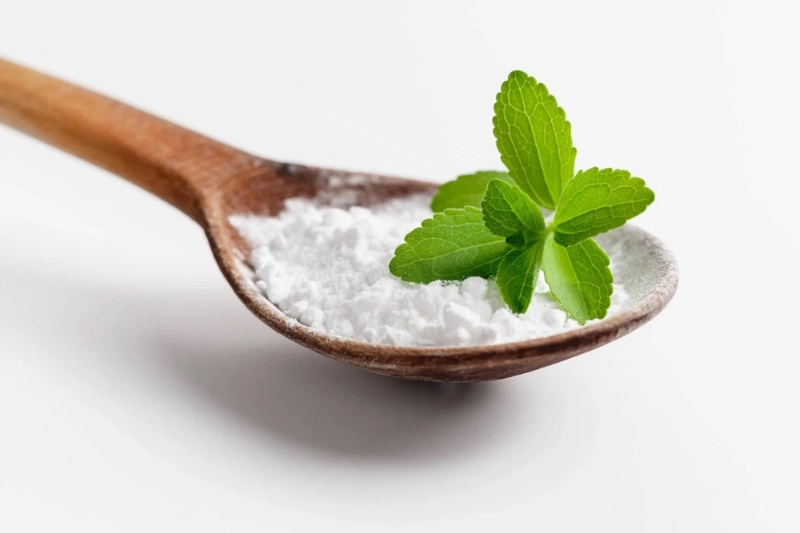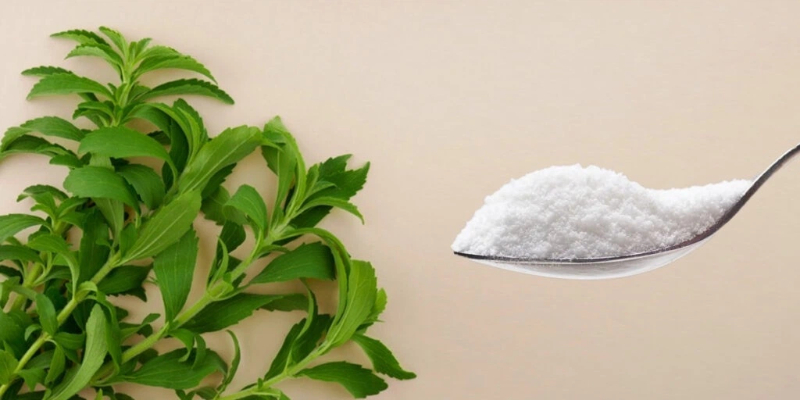







Content Menu
● Stevia vs. Sugar: Understanding the Difference
● Health Benefits of Stevia as a Sugar Replacement
● Stevia's Role in Modern Food, Beverage, and Healthcare Industries
● Culinary Uses and Baking with Stevia
● Safety, Regulation, and Consumer Acceptance
● Environmental and Economic Aspects of Stevia Production
● Potential Downsides and Considerations
● How Stevia Is Transforming Dietary Trends
● Stevia: More Than Just A Sugar Substitute
● FAQ
>> 1. Is stevia completely sugar-free?
>> 2. Can I use stevia for baking and cooking?
>> 3. Is stevia safe for children and pregnant women?
>> 4. Does stevia have any side effects?
>> 5. How does stevia compare nutritionally to other sweeteners?
Stevia has surged in global popularity as a sought-after natural sweetener, especially among consumers and manufacturers targeting healthier food and beverage solutions. But despite its sweetness, stevia fundamentally isn't considered sugar. So, what exactly is stevia? How does it compare to traditional sugar in nutrition, health, and culinary applications? What makes it so attractive to food, beverage, and healthcare industries aiming to reduce sugar content while maintaining palatability? This article explores the nature of stevia, its differences from sugar, health advantages, industrial relevance, and answers frequent questions for consumers and manufacturers alike.

Stevia is a plant-based sweetener derived from the leaves of Stevia rebaudiana, a perennial herb native to South America. The leaves contain unique sweet compounds called steviol glycosides, which are responsible for stevia's extraordinary sweetness—up to several hundred times that of sucrose. These glycosides are extracted and purified into white powders or clear liquids, which become the active sweetening ingredient.
Unlike sugar, which directly provides energy and calories, stevia delivers much of its sweetening power without carbohydrates or calories. Stevia's leaves have also seen traditional medicinal use, suggesting metabolic and therapeutic benefits dating back centuries. Today, stevia-based sweeteners are available for home use as well as in commercial food, beverage, and healthcare products, making the plant's legacy more relevant than ever in combating excessive sugar intake and related health issues.
Although both stevia and sugar are used to sweeten foods and drinks, they differ significantly in chemical composition, nutritional impact, and physiological effects. Sugar, typically sucrose, is a simple carbohydrate obtained from sugarcane or sugar beets. Each teaspoon contains about 16 calories and rapidly breaks down into glucose and fructose, which enter the bloodstream and spike blood sugar levels.
Stevia, in contrast, consists of steviol glycosides that interact with our taste receptors to produce sweetness, but they are not metabolized by the body like sugar. As a result, stevia provides virtually zero calories per serving and does not elevate blood glucose or insulin. Its glycemic index is zero, making it ideal for diabetics and those watching carbohydrate intake.
One of the major differences lies in the amount needed for sweetness. Stevia is 200-400 times sweeter than table sugar, meaning a tiny fraction suffices. Some products blend stevia with bulking agents so users can replace sugar one-to-one in recipes. Unlike sugar, stevia has little impact on the texture, browning, or bulk of baked goods unless combined with other ingredients.
Replacing sugar with stevia brings distinct health advantages. First and foremost, it reduces calorie intake—an important benefit in addressing obesity, weight gain, and non-communicable diseases linked to high sugar consumption. Consuming stevia instead of sugar lessens the glycemic load of meals, supporting stable blood sugar levels and reducing insulin demand. This is especially critical for the growing number of people with diabetes or insulin resistance worldwide.
Stevia may also contribute to oral health, as it does not feed oral bacteria that cause tooth decay or cavities, a proven risk associated with sugar. Some emerging research suggests that stevia's phytochemicals possess anti-inflammatory, antioxidant, and possibly blood pressure-lowering properties. The wide safety margin of purified steviol glycosides has led regulatory agencies including the FDA, EFSA, and others to approve their use for all populations, including children and pregnant women.

The low-calorie, plant-based origin, and metabolic neutrality of stevia are shaping the new generation of functional foods, health beverages, and pharmaceutical products.
Manufacturers increasingly rely on stevia to meet consumer demand for products that taste sweet, yet are diet-friendly and align with trends towards wellness and lower sugar intake. Stevia's versatility allows it to be used in the following applications:
- Reduced- and zero-calorie beverages, such as sodas, teas, and flavored waters
- Health-conscious snack foods, bars, yogurts, and dairy alternatives
- Sugar-free gums, candies, chocolates, and tablets
- Chewable supplements, lozenges, and syrups that must taste palatable yet not contribute sugar or artificial additives
- Blended sweetener solutions: Manufacturers may combine stevia with other natural sweeteners or fibers to mimic sugar's taste and texture in more complex applications
For factories engaged in OEM or ODM services, stevia is a central ingredient in custom-blended sweetener formulas tailored to the international market's evolving needs.
Stevia's intense sweetness means that manufacturers and home bakers use less volume than sugar. Pure stevia powder or concentrated drops can sweeten recipes, but lack sugar's bulk and browning properties required for some baked goods. To solve this, commercial stevia products often include bulking agents or blend stevia with erythritol, maltodextrin, or dietary fiber to achieve a one-to-one sugar substitute.
Bakers must adjust recipe moisture, texture, and volume when switching fully to stevia, as the absence of sugar can affect the rise, tenderness, and golden hue of baked items. Stevia's slightly herbal or licorice-like aftertaste is mild, but more noticeable if overused. Many find that a blend—part stevia, part sugar—delivers optimal results, gradually reducing sugar content but maintaining flavor and mouthfeel.
Global regulatory agencies regard purified steviol glycosides from stevia as safe for consumption, with standards governing acceptable daily intake. This means stevia-based sweeteners are widely approved for use in foods and drinks, sometimes explicitly recommended for populations requiring lower sugar intake.
The use of crude stevia extracts or raw leaves in foods varies by region due to incomplete safety evaluations, but commercially available, refined stevia preparations meet recognized standards.
Consumer acceptance has soared as people seek alternatives to sugar for health, dietary, or personal reasons. It's important, however, to choose high-quality stevia products to avoid unwanted fillers, additives, or off-flavors.
Stevia cultivation requires less land, water, and agricultural inputs compared to sugarcane and sugar beet farming. Its sustainability profile is attractive to environmentally conscious food producers and manufacturers aiming to reduce their ecological footprint. Stevia plants are hardy and can yield multiple harvests annually, increasing efficiency and minimizing resource consumption.
The economic impact extends beyond farming to processing, R&D, and formulation, underpinning an entire segment of the health-ingredient supply chain focused on functional sweeteners. Many companies in China and worldwide specialize in natural sweetener development and OEM/ODM services for global brands.
Though stevia offers many benefits, it is not entirely without drawbacks. Owing to its unique taste, some consumers notice a mild licorice-like or herbal aftertaste, especially with excessive use or low-quality products. When used improperly in baking, stevia may yield less satisfying textures or flavors compared to traditional sugar.
Moreover, the psychological effect of consuming sweet-tasting substances—even zero-calorie ones—can perpetuate cravings for sweet foods, potentially hindering efforts to reduce overall sweetness or calorie intake. Nutrition experts thus advise using stevia in moderation within the context of a balanced, whole-food diet.
The rapid growth in demand for stevia reflects broader trends towards health-conscious and functional foods. As more governments, nutritionists, and organizations advocate for reducing added sugar in processed foods, stevia becomes an essential tool in reformulation.
Products containing stevia can help meet regulatory guidelines for sugar content, labeling claims for "sugar-free" or "reduced sugar," and consumer expectations for taste and health. For international manufacturers, stevia allows for broader market access and compliance with both local and overseas food standards.
Stevia is not just a sweet replacement—it represents a leap forward in food science and nutrition. By integrating stevia-based solutions, manufacturers can innovate across food, beverage, and healthcare products, offering consumers new ways to enjoy sweetness without compromising health.
As research continues, new applications arise: from blended sweeteners, functional dietary fibers, and low-calorie bulking agents to nutritional supplements and novel food formats, stevia's potential continues to expand. Factories that specialize in sweetener ingredient development can build upon stevia's profile to deliver cutting-edge health solutions for global brands.
Stevia is not considered sugar, despite its potent ability to sweeten foods and beverages. Derived from the Stevia rebaudiana plant, it is calorie-free, carbohydrate-free, and does not raise blood sugar, making it much healthier than traditional sugar for most applications. Its adoption across food, beverage, and healthcare sectors is helping reduce global sugar consumption and fostering better dietary habits. Although stevia's taste or function may differ slightly from sugar in some culinary uses, its health and environmental benefits make it an increasingly indispensable ingredient. Whether you're a manufacturer seeking to produce cutting-edge, health-focused products, or a consumer looking for safer ways to enjoy sweetness, stevia answers the call for innovation in taste and wellness.

Yes. Stevia contains no sugar molecules, does not provide carbohydrates or calories, and does not impact blood sugar levels. It is classified as a non-nutritive sweetener.
Absolutely. Stevia can be used in a wide range of culinary applications. For best results, use commercial stevia blends designed for substituting sugar one-to-one, as pure stevia is much sweeter and may require recipe adjustments.
Purified stevia extracts have been found safe for all populations by major global food safety authorities. Always use reputable products and moderate consumption as part of a balanced diet.
Stevia is well-tolerated by most. Occasionally, some experience mild digestive upset or an aftertaste, especially with excessive intake or lower-quality products.
Unlike sugar, agave, honey, or maple syrup, stevia contains no calories or carbohydrates and does not raise blood sugar. Compared to artificial sweeteners, stevia is plant-derived and has a stronger safety profile.
[1](https://injiyastevia.com/blogs/stevia-wellness-insights/stevia-vs-sugar-which-is-healthier)
[2](https://thrivemarket.com/blog/stevia-vs-sugar)
[3](https://www.healthline.com/nutrition/stevia-vs-sugar)
[4](https://rockypointrx.com/stevia/)
[5](https://sporked.com/article/stevia-vs-sugar-2/)
[6](https://www.bodi.com/blog/stevia-vs-sugar)
[7](https://pmc.ncbi.nlm.nih.gov/articles/PMC10097272/)
[8](https://health.clevelandclinic.org/what-is-stevia)
[9](https://www.reddit.com/r/nutrition/comments/1e58908/stevia_is_not_200_to_400_times_sweeter_than_white/)
[10](https://www.uhhospitals.org/blog/articles/2022/08/are-natural-sweeteners-healthier-than-sugar)
